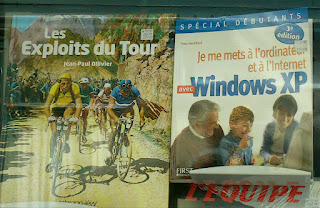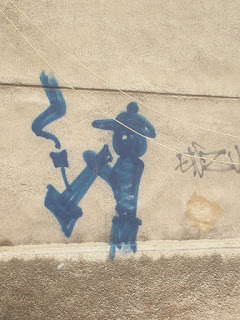
Abbeville
Kitty, Esra and Chantal grew up in Dreumel, a Dutch village; they were close for a long time, but with college they grew apart, coming together again at the funeral of Kitty’s father, ten years later. Nothing had changed, they began to meet regularly, to cook and talk; soon to travel together, not building their friendship but evolving it: this friendship has roots.
Now in their thirties they all live and work around the town of Breda. Esra is expecting a child.
Abbeville is the lunch-time pit-stop of their latest weekend break from Holland, Kitty says; tonight they will be together in Ault, or Le Trépart. “Eating fish, maybe we’ll rent some bikes.”
“At least the weather is good, and the people are so much more friendly than in Holland. It rains there, and people are closed, it is too cold.” Esra says. “Dining and wine, and laughing, the weather…” Chantal says, that’s what is needed.
They found the Bed & Breakfast at Ault with the internet, know nothing about it except that it is confirmed. This is an adventure: not necessarily of place but of renewed connection. What is “there” can only be a bonus. Good food and drink, conversation, and they are content.
English is a given in Dutch education, and they are fluent: are mildly surprised that in Northern France the bug for English hasn’t caught on everywhere. “To graduate in Holland we must have English,” Kitty says. “It’s the language of the world now, and computers.”

Kitty makes the signage and the interiors for shops. “Someone else does the psychology and the marketing, I make what they need.” But she, like Esra and Chantal, is not happy about the way the world evolves. “When I was a child I went to the grocery store and there were three or four kinds of yoghurt; now there are fifty. It is too much, we don’t need it all.”
Chantal agrees. “Too much choice. Once, you went to the meat shop, the vegetable grocer, the fishmonger, cheese…now you visit one hyper-market where everything is about choice and speed.”
“It’s business,” Kitty says. “I often say to my mother, ‘I wish I had been you, born after the war, growing up in the sixties and seventies’. That was a ‘real’ life. This – us – it is all too much.”
But what would that have meant? “I’m 34, that means I would have been married, had children, a house. No job. But there was a logic.” Kitty says. “They had a great marriage – we were lucky, so many end up in divorce.”
They think Amsterdam has grown like London, or Paris. “Too expensive for real life,” Chantall says.
Our times do see progress though, Kitty says. “My father, he was ill for a while. Mentally unwell, he was so ashamed to go into a hospital. When I told him I was going to a psychiatrist he said: ‘I am so proud of you, confronting your problem.’”
The women get together because it is fun, freedom; they can talk at a natural rhythm. “In Breda we have jobs, lives. It is all too busy,” Esra says. “When we come away we can just be.”
Chantal says that she was most happy in Egypt and India: each place gave her something unique. “India showed me other ways. Yoga, the spiritual, but perhaps the best was the desert in Egypt. The people were so friendly, and we were away from everything – the tourists, people. Even language. We didn’t need language, we just needed to see and experience.”
I too have felt that feeling: away from it all – the tourists, commercialism, language – and have heard so many of us telling similar stories from Madagascar to Tierra del Fuego. Of course our freedom has been bought: we are the tourist that the man and woman over the next dune are trying to avoid. For all our unique experiences, there is someone around the corner having much the same. And yet we need travel.
In The Attractions of France, a brief piece found after his death, Bruce Chatwin writes a short story about Africa. In it an Arab boy with “hard thighs” tells the narrator that he is:
“From Atar,” he said, “I will go to Villa Cissneros. I will take a ship to Gran Canaria. I will go to France, to Yugoslavia, to China, and continue my profession.”
“As sanitary engineer?”
“No, Monsieur. As adventurer. I will see all the peoples and all the countries of the world.”
Is this not all of our dreams?
And now there is Google Earth. All three women use the internet every day, but worry about its hermetic nature. “The kids now, so aggressive, so forceful. I think it is the games.” Kitty says.
She has been to Australia, which changed her way of seeing the world: “it is beautiful, but it is not a place for shy people. I learnt not to be shy.”
Now all three are “not shy”, there is communality as they speak, a shared confident view. “I think all of us northern Europeans need lightness sometimes, the sun,” Esra says. “Even just to go to Spain.”
I thank all three for their time. “No, it is different. Meeting new people. We saw your boots, we knew you were “travelling.” ‘
“We thought you were a writer,” Chantal says.
Sometimes I think the same.












































